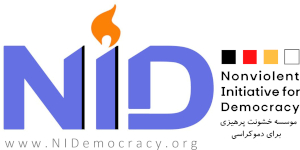Following the execution of two more protesters, nationwide protests erupted in Iran as 61 women political and ideological prisoners detained in Evin Prison announced their intention to stage a hunger strike on the fifth of Bahman (January 25) in protest against the executions, while advocating for their cessation.
On the third of Bahman, Narges Mohammadi’s Instagram page, the Nobel Peace Prize laureate and long-time activist against violence campaigns, stated: “Women prisoners will resist to keep the names of the executed alive and to keep hundreds of individuals alive who are awaiting execution in the prisons of the Islamic Republic throughout the country, and on the fifth of Bahman, they will demonstrate their protest with a collective hunger strike.”
In the wake of this non-violent action, many activists and families of prisoners and defendants expressed support for this general strike on social media, and the hashtag “No to Execution” trended.
Karim Mohammadi, the father of Narges Mohammadi, wrote: “I heard the news of my daughter Narges’s protest and the brave women of Evin Prison who have joined hands with diverse political and ideological inclinations, standing against the government’s execution crimes. For two months, Narges has been denied visits, and I long to hear her voice, but I am proud of their resilience and will not eat in solidarity with them from morning till night. I urge every Iranian to support the standing women of Evin and firmly oppose executions.”
Shortly after this announcement, Tumaj Salehi’s page on the X network stated: “Following the murders of Mohammad Qabeloo and Farhad Salimi, two political prisoners, tomorrow, Thursday the fifth of Bahman, Tumaj Salehi, along with 61 women political and ideological prisoners in the women’s ward of Evin Prison, will go on a hunger strike in protest against these killings and to demand their cessation.”
Additionally, Bahareh Hedayat and Zeynab Jalalian, prominent political prisoners, separately announced their participation in this strike.
In a message from Evin Prison, Bahareh Hedayat stated: “We, women political prisoners in Evin Prison, will be on strike for a day to oppose this demonic mechanism. I believe the ultimate goal of this strike is to protect the struggle against the Islamic Republic; to protect the consciences of freedom that have recently been ensnared in the suffocating suppression.”
Hassan Hayoun, the husband of Saeideh Shafi’i, a political prisoner, wrote after the announcement of the general strike: “I too, in support of my wife Saeideh Shafi’i and 60 women prisoners of Evin, will not eat food or drink water on Friday, the fifth of Bahman, and support the hunger strike of the women prisoners. Joining the hunger strike is an expectation that women prisoners have at least from their relatives and friends.”
Moreover, Khodarahm Gholian, the father of Sepideh Gholian, also wrote on his X network page after the announcement of the general strike: “If my daughter were free, she would face the same sentences, we won’t stay silent, and families will join the women’s prison strike. We, as the families of beloved Zaynab Rezaii and Sepideh Gholian, will go on a hunger strike.”
Today, in Mel Lastman Square in Toronto, Canada, a group of Iranians joined the general strike of women prisoners. Milad Mohammadi, the brother of Shahriar Mohammadi, one of the victims of the “Life of Freedom Women” movement, called on Canadians to join the strike. This gathering followed protests against the murder of Mohammad Qabeloo and Farhad Salimi, political prisoners.
Zahra Rahnavard, a prominent figure in the protests of 1388, who is under house arrest with her husband Mir Hossein Mousavi, also reacted to the execution of Mohammad Qabeloo on Thursday, stating: “The rulers have caused a sea of blood to flow throughout the country. They kill Iran’s children. Don’t the rulers think that it won’t be long before they drown in this sea of blood themselves and the morning will dawn on the nation’s rescue?”
Saeed Madani, a sociologist prisoner, also wrote from Evin, titled “Against Execution”: “The tyrants execute to suppress the challenge to their power and to maintain and rejuvenate the spirits of their servants. Because they have lost hope of ruling over the hearts and minds of the people entirely and they perpetuate their illegitimate power over people’s fear.”
This campaign has also received unprecedented support in Iranian civil society. Reports indicate widespread slogan writing against the execution of political prisoners, and even a video circulated on social media showing an elderly man protesting individually with a placard against the execution of Iranian protesters.
Simultaneously with these widespread endorsements, many countries, including the United States, condemned these executions and called for an immediate halt to the execution of political prisoners.
Although Narges Mohammadi’s special position as a prominent figure in civil struggles had a significant impact on the extensive support from various segments of Iranian society, one must not overlook the collective pain caused by the continued trend of illegal executions among the Iranian people.
The breadth of public support for such protest methods also indicates an increase in awareness among political and civil activists in Iran. It should be noted that this collective awareness is the result of years of efforts by prominent non-violence activists such as Narges Mohammadi, Farhad Meysami, Saeed Madani, and Bahareh Hedayat.
More than that, there is a precedent for such campaigns in Iran that has laid the necessary groundwork for widespread public support for these protest methods. Those who have read Erica Chenoweth and Maria Stephan’s book “Why Civil Resistance Works” are familiar with the theory that “magnitude” is essential to significant social movements. Their “3.5% rule” has become widely accepted, stating that when movements engage at least 3.5% of the population effectively, success becomes inevitable.



